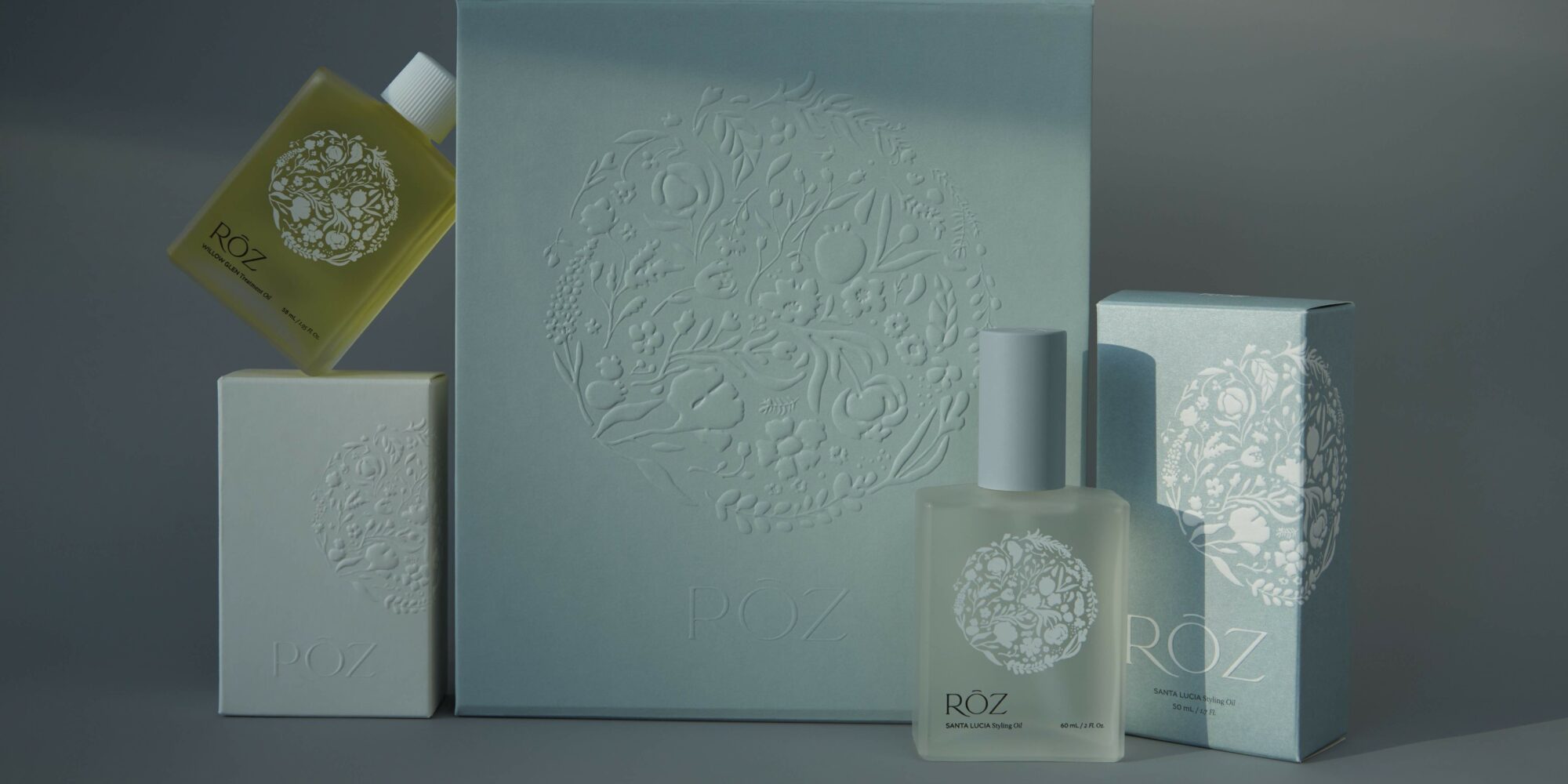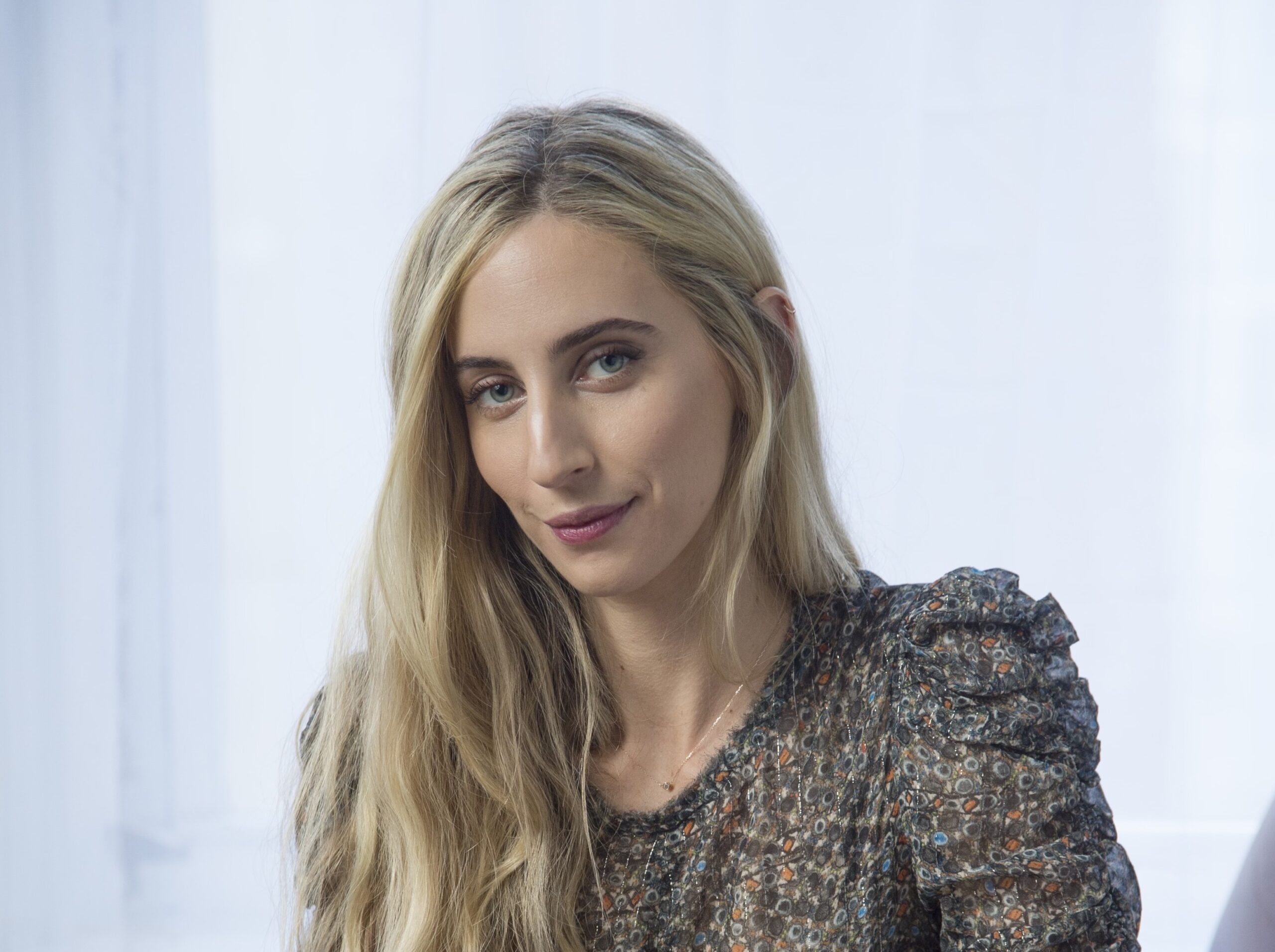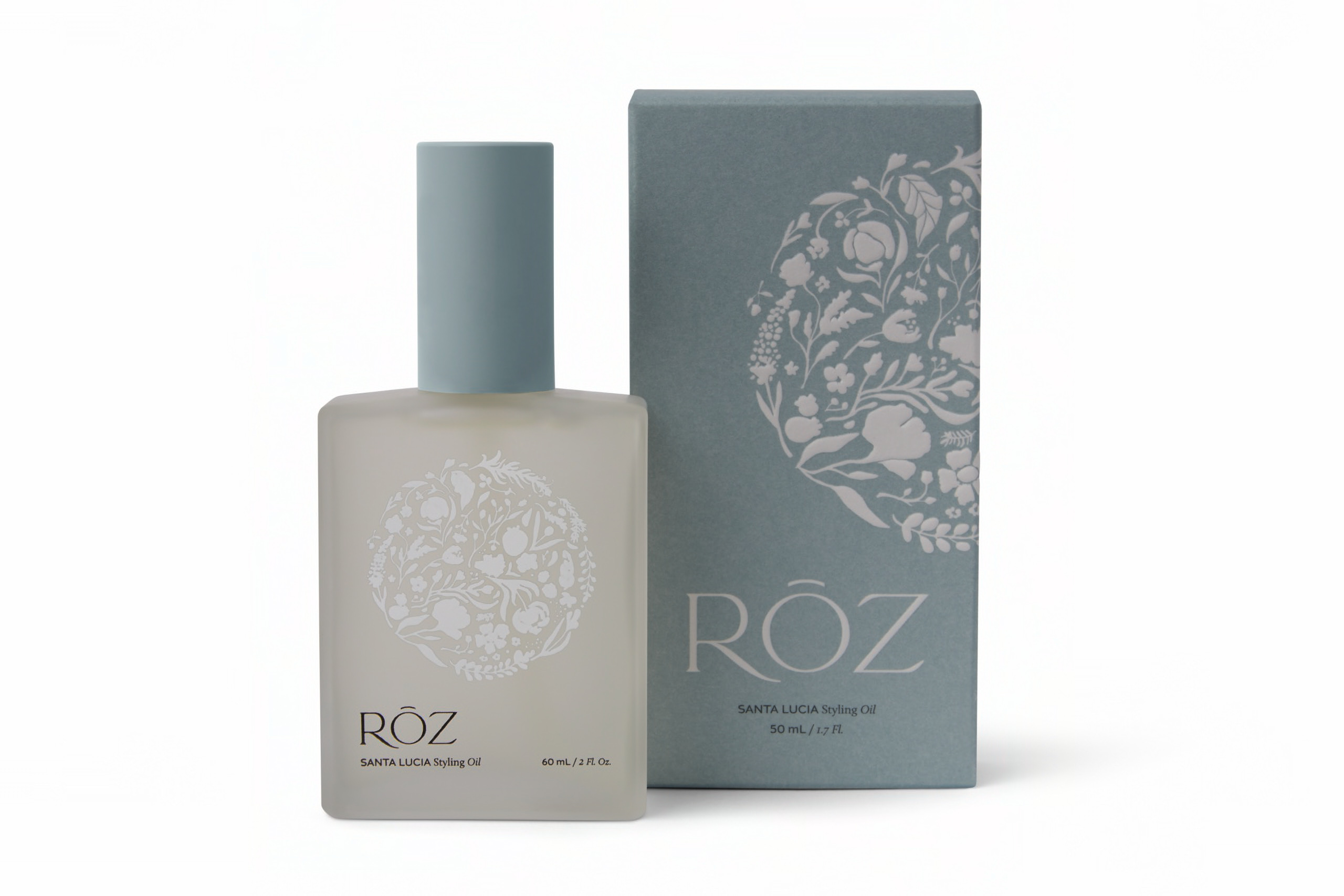
Celebrity Hairstylist And Roz Founder Mara Roszak’s Hair Oils Provide The “Foundation For Every Hairstyle”
As as veteran hairstylist for Hollywood’s biggest stars, including Emma Stone, Nicole Kidman, Zoe Saldana, Olivia Wilde and Natalie Portman, Mara Roszak could’ve launched her own brand many years ago, but she waited. She wanted to learn about the industry from leading haircare companies, clients and consumers broadly to create a brand that would make an indelible mark. Even when she launched her brand, Roz, which is pronounced like the word “rose,” in 2021, she did it carefully with a single product: $45 Santa Lucia Styling Oil.
“I got into this because I wanted to build a brand that lasted, not just a brand of the moment and not just a brand with one product,” says Roszak. “I wanted to solve a great problem with a long-lasting brand that will really help people with their hair needs, but I didn’t know what to expect or even how to do it.”
Today, Roz has two products—$48 Willow Glen Treatment Oil has joined the lineup—and a focus on premium clean hairstyling essentials that gives it a clear point of difference in a crowded haircare field. With its early traction giving her confidence in Roz’s appeal, Roszak has plenty in the brand’s product pipeline and ambitions to grow its distribution in retail and at salons.
Beauty Independent spoke to her about getting started in hairstyling as a teenager, her experience working for internationally known brands, why hair oils are critical tools in her kit, the hairstyle she thinks will be huge this year and the hairstylist she draws inspiration from as she guides her brand.
How did you start to get interested in doing hair?
I would describe myself as an introverted kid. It wasn’t until I discovered this world of beauty that I came into my own and found a confidence and a skill set that I was good at. School wasn’t doing it for me.
I had hair that I felt was really unmanageable. This is the early ‘90s when straight sleek hair was very trendy, and all of my friends seemed to naturally have that. I was really determined to get my hair to like the way I wanted it to look.
We didn’t have the resources to go to a hair salon. I decided to figure out how to navigate my own hair and got really good at doing it, so much so that my friends wanted me to do their hair before birthday parties and bar mitzvahs. My house became the house that everybody gathered at because I was dressing everybody and doing their hair and makeup. That was the initial spark.
Did you know that you could be a hairstylist professionally?
Nobody in my family was in the beauty world, but I knew of a beauty school because we lived across the street from a Marinello School of Beauty, which is closed down now. It was between the 99 Cents Only Store and Sizzler on Wilshire Boulevard. It wasn’t where I wanted to go. I had heard of Vidal Sassoon, but it was more expensive.
My mom was a sculptor before I was born, and then she was managing a kids’ retail store. In the shopping center where she was managing there was a Carlton Hair salon. She was a single mom, and she was looking for somebody to tell her she wasn’t insane for letting me get my GED and go to beauty school. She found that at the Carlton Hair Salon, where this guy said to her, “The younger, the better. If she’s interested, have her do it.” I was 16 when I entered beauty school at Marinello.
Did you want to become a celebrity hairstylist?
No, I had no idea about that. I remember seeing pictures of celebrities, and I remember one time taking a picture of someone, probably Brittany Murphy, to the counter to get eye makeup done like her, but I never thought there’s somebody doing that for her. I just thought, I love doing my friends’ hair, and whoever will let me do it, I will work at a hair salon and do that. I wasn’t thinking that far ahead.
In beauty school, I met someone working the front desk at the Chris McMillan Salon. I feel like I can say this now having never felt this way in school, but I was a standout at beauty school. I don’t know if that really says that much, but, for me, it said I’m actually good at this, and people who don’t know me and aren’t my loved ones are like, “Wow, where did this young kid come from?”
The guy I met who was working at Chris McMillan Salon said, “You have to come and meet the team.” That became a path for me in my head. I was like, “That’s where I will go and work one day.”
What was entering that world like for you?
It was so exciting and definitely intimidating. I thought everybody was so cool. Obviously, they were so talented. I was still more on the quiet side, but I listened really well, and I wanted to learn and that got me really far in that environment, and I was creative. I always had cool hair, and that went a long way.
I got to assist there for a little bit. I did a lot of blow-dries. They would let me cut my friends hair, and I got a couple of my friends’ jobs at the front desk. I would do some haircuts, and the stylists at Chris McMillan would be like, “These are good.” I had natural talent and obviously a passion. It started to get noticed there because I had hands-on practice.

When did you get known for celebrity hairstyling?
A family friend was a big publicist to celebrities. She called and said, “I have a job for you. Can you do Sarah Michelle Gellar’s hair?” This was probably 2002/2003, and she was a big star at the time. I said, “Of course!” I still look back at the photos and think it wasn’t bad. I was really good at blow-drying hair, and I did very soft, flattering hairstyles that really worked.
My hairstyles had a lot of flow, nothing felt overly stiff. That’s still my approach today. My mom is a sculptor, and I approach hair in a sculptural way, working with the texture of someone’s hair rather than against it.
At what point did you begin to work with brands?
I was around 24. My first contract was with Tresemmé. After that I was with L’Oréal Paris. With L’Oréal, I was the first and youngest female. I was probably 26 when that happened. That was huge for me.
I loved that work. I love education. I love meeting people. I got to meet so many beauty editors. I got to do hair a lot of the time for the job. I thought, “This is great, I like to talk about products.” I wasn’t always talking about products I genuinely liked, which was the biggest challenge, but I loved every other aspect of it.
Did you have offers to do a brand?
Of all of the things I wanted to do in my career, I can genuinely say creating a brand is what I wanted to do most. I’ve had some of my clients for 20 years, and one of my clients reminded me the other day that, “The day I sat in your chair the first time, you said you wanted to do a product line.” That was over a decade ago, so it’s been a long time.
I was under contract pretty much through my whole career, and offers came to me to do big brand partnerships. I remember one opportunity where it was like, “Can you put your name on a product that we create and formulate?” I knew in my heart of hearts that wasn’t really what I was interested in.
Why do that if I can be an ambassador for a brand and my name is not on the product, so there is a level in which I’m not as associated? I can talk about how to use the products from a stylist perspective, but I wasn’t necessarily saying, “This is what I would create if my name were attached to this.” I didn’t really want that opportunity, even though it probably would have been an easier path.
Tell us about the path you took.
In 2018, I felt it was really the time to do this, but I didn’t really know how. So, I started asking. I wanted to start with hair oil because I love styling oil. It’s the foundation for every hairstyle I create. It’s the base layer.
People now tell me it’s great you started with one product instead of launching a whole range, tested the market and had it be a styling product since I’m a stylist, but it came from a passion for formulating a styling oil that would be lightweight and clean. I wanted it to be free of silicones.
Performance was most important. I wanted it to be lightweight so it would work on my hair, which needs a bit of taming, and also my fine-hair clients. Everybody can benefit from it before a blowout.
A friend of a friend had a connection with labs. From there, I started the process of getting lab samples. I worked with another lab to develop a custom fragrance. There are all these different vendors. It takes a lot of time and work.
Was launching with a single product a very intentional strategy?
That wasn’t really the strategy. I just thought, I’m going to learn the process and not overwhelm myself, but I know I’m not going to stop there. Also, it was expensive, and I was self-funded.
I knew I wanted it to be super beautiful because I love apothecary. I was very inspired by that. The packaging is really beautiful. It’s glass with an aluminum cap. Beauty products really are an emotional experience. They definitely are for me.
What goals do you have for the business?
I think [Olive & June] founder Sarah Gibson Tuttle said in an interview that you have to go into it a little bit blindly because, if you know too much, it will overwhelm you and make you not want to do it.
It’s not like I was just like, “Hey, I’m going to just try it out and not care about the result.” I always wanted to make an impact and still do. I wanted to create a brand that people would know and use, but I was genuinely excited to have five people purchase the products.
Our launch was a very exciting day, and we did beyond what I thought we would do, but I didn’t set my expectations so high initially. We launched just on our website, but I always knew I wanted to expand to retail because that’s how I shop. I love going to The Detox Market and Bluemercury and discovering new brands, so I knew I wanted to do that from the beginning. We are in a few retailers and a few salons and are going into more.
How do you plan on building out the product pipeline?
With Roz, I wanted to really solve the overwhelm of there’s all these products out there, but people still don’t know what to choose. I’m only creating essential, versatile products that will allow people to create any hairstyle they want to create, and all of the ingredients are clean and high-performing.
We are creating products that nourish the hair and more styling products. We will do that to simplify and be the go-to place for hair texture styling needs in the clean luxury space. We are still working on our 2023 calendar for launches, but I can very confidently say we will have at least four.
What makes the brand different from what’s been out there?
The luxury hair market is growing. There are some clean hair brands out there, for sure, but I don’t think anyone is doing what we are doing. We are really owning the styling, texture space in high-performing clean products.
I am an expert. I’ve been doing hair for 20 years. I know what people need, what to use and how to use it. We want to be a professional brand that hairdressers love and use. We plan to build out education and work with hairdressers because that’s my community. That’s who I am and who I know how to speak to.
I also know how to speak to consumers from all of my years working with huge brands and talking to my clients who sit in my chair, and I get to go and do celebrities’ hair. We will be able to talk about the product being used for big red-carpet moments and how to recreate those looks.
You are a partner in the Mare Salon. How’s business going?
I would say we are back to normal. It was definitely a real challenge with COVID, but all of our stylists completely understood that we were all in it together.
My partners [Alex Polillo and Denis De Souza] really operate Mare. I still work in the salon and take clients there occasionally. I try to have a day at least a month where I book out my schedule at the salon. The salon is doing incredible now. I’m so happy that we’ve made it through and have managed to get back to a state of normalcy.
Social media has changed so much from when you started. Now, people are able to get glances behind the scenes at what you do as a celebrity hairstylist.
I follow hairstylists and learn from their tutorials. We didn’t have that growing up. I had to figure it out on my own. And celebrity clients really get it. Behind the scenes is a very expected part of the process now. We aren’t really allowed to pull images from Getty, so getting your own press in is so important. Often, we take really great pictures.
There’s also an intimacy there when someone is getting ready. I met Emma Stone when she was 17. We have been in each other’s personal space for so long now that there is a comfort there and a lot of trust. So, there’s the combination of getting fun educational content, really showing the products and the process, and then taking really pretty pictures we all get to use on our socials. It helps everybody.

In the kit of products you use, you don’t have all clean products. So, why was it important for your brand to be clean?
It’s because it really hasn’t been available and that’s why my kit wasn’t made up of it. I have always been conscious of it, but I couldn’t sacrifice performance. I’m showing up at a job, and the products can’t make the process harder on me.
Now, we are living in a different time, but it’s still a challenge. There is one person on my team whose job it is to be constantly vetting labs to make sure the ingredients are clean and sustainable, and the innovations are strong to create high-performing products. I don’t think you should have to sacrifice performance, and we are definitely up for the challenge.
We are a small brand right now, and I don’t have the pressures that bigger brands have. We don’t have to launch just to launch. We get to make sure the formulation is just right. I won’t put a product out there that doesn’t genuinely work for people that’s up to my standards and pretty strict clean standards as well.
Where do you think your brand will be in five years?
Someone asked me recently, “How are you feeling about it?” I was like, “I’m doing the thing that I want to be doing. There is nothing else I rather be doing.” I feel like I’m in the right time of my career to create this brand. Nothing great comes that easy, and this is definitely a challenge. I’m learning so much, but it’s pushing me, and I’m creating something I’m very proud of.
I’ve never been a five-year goal person because I think the expectation piece is overwhelming, but, by then, I think we will have created a very solid range of products to help people have hair essentials to create the looks they want to create. I want us to be at stores. I would love to be in Sephora. I hope, in five years, we are a recognizable brand that is a part of daily routines.
Do you have any brand role models?
I would say Oribe. He was a hairdresser, a very talented one. They developed products that were really great styling products. I loved the performance of them, and I personally loved that it was a professional brand of someone I really admired and trusted. For a while, they were creating products that felt necessary.
What do you think will be the “it” hairstyle of 2023?
Healthy hair is always be very much on trend, and I mean that with haircutting, too. We did the overly layered shag thing. I think it’s going to be about fewer layers, movement and volume—healthy and shiny. I would say less choppiness. I have cut a couple of soft shoulder-length bobs. They don’t have hard edges, and they swing easily. I think we will be seeing more of that.





Leave a Reply
You must be logged in to post a comment.